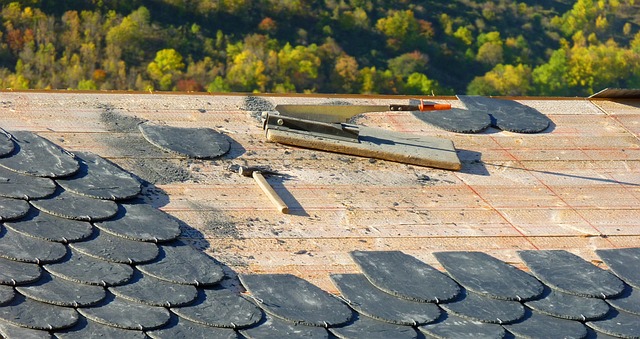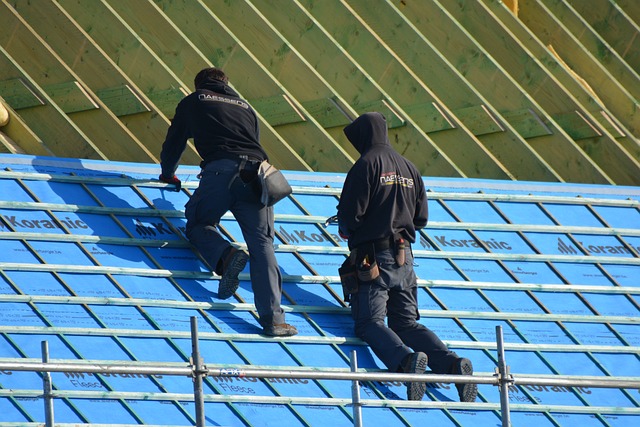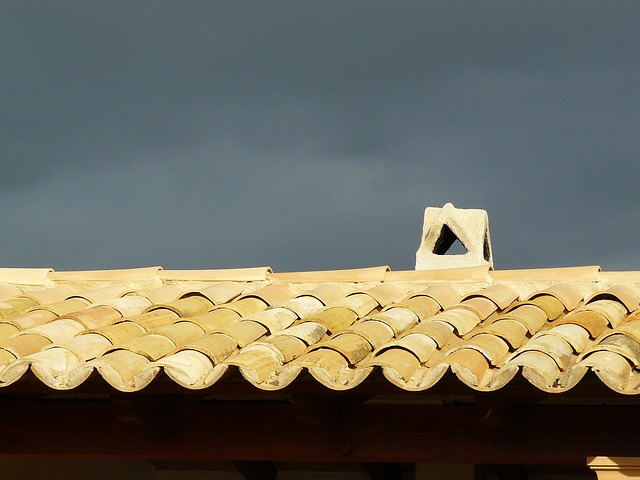Roofers now extend beyond traditional roles, playing a critical part in enhancing energy efficiency in buildings. They specialize in installing advanced insulation and barriers that are essential for a structure's energy conservation strategy. These experts understand thermal dynamics across various roof types and select insulation materials that optimize energy retention, sealing leak points to prevent the loss of conditioned air and reduce heating and cooling costs. Additionally, they apply high-efficiency barriers like reflective coatings and waterproof membranes that protect buildings from solar radiation and weather damage, thereby extending roof lifespans. By adhering to industry standards and utilizing innovative materials, roofers are instrumental in creating energy-efficient spaces with a lower carbon footprint. Their proactive approach to selecting and installing the right insulation—including spray polyurethane foam (SPF), fiberglass, or cellulose—ensures optimal thermal performance tailored to specific building needs, resulting in significant energy savings and sustainable construction outcomes. Engaging with skilled roofers is essential for leveraging these energy-saving measures effectively.
Effective energy management within residential and commercial buildings is paramount in today’s climate-conscious society. A pivotal aspect of this endeavor is the strategic installation of insulation and barriers by professional roofers. This article delves into the critical role that roofers play in bolstering a structure’s energy efficiency, examining various types of insulation materials they employ for superior thermal performance and outlining the techniques used to install protective barriers that seal the path to energy conservation. Understanding these elements not only contributes to cost savings but also significantly reduces environmental impact.
- Understanding the Role of Roofers in Enhancing Energy Efficiency with Insulation and Barriers
- Types of Insulation Materials Best Applied by Professional Roofers for Optimal Thermal Performance
- Strategic Installation of Barriers by Expert Roofers: Sealing the Path to Energy Conservation
Understanding the Role of Roofers in Enhancing Energy Efficiency with Insulation and Barriers

Roofers play a pivotal role in the broader effort to enhance energy efficiency within residential and commercial structures. Their expertise extends beyond the traditional installation and repair of roofing materials; modern roofers are now adept at integrating advanced insulation and barriers that serve as critical components in a building’s energy conservation system. These professionals understand the thermal dynamics of various roofing systems, which enables them to select the most appropriate insulation materials. By carefully sealing and insulating gaps, cracks, and joints, roofers effectively prevent conditioned air from escaping and external air from entering. This not only reduces heating and cooling costs but also contributes significantly to overall energy efficiency.
Moreover, roofers are skilled in the application of high-performance barriers, such as reflective coatings and waterproof membranes, which reflect solar radiation and shield the building from extreme weather conditions. These barriers can extend the lifespan of the roof by protecting it from UV damage and temperature fluctuations. The integration of these systems by roofers is a testament to their evolving role in sustainable construction practices. By adhering to the latest industry standards and utilizing innovative materials, they are instrumental in creating energy-efficient environments that reduce carbon footprints and promote eco-friendly living. This proactive approach to insulation and barriers installation underscores the importance of collaborating with knowledgeable roofers to achieve a more sustainable future.
Types of Insulation Materials Best Applied by Professional Roofers for Optimal Thermal Performance

When it comes to enhancing a building’s energy efficiency, the choice of insulation material plays a pivotal role in achieving optimal thermal performance. Professional roofers are well-versed in the various types of insulation materials available and can expertly install them to ensure maximum benefits. Among the most effective insulation options for roofing applications are spray polyurethane foam (SPF), fiberglass, and cellulose insulation.
Spray polyurethane foam is a versatile material that offers high R-values per inch, which means it provides excellent thermal resistance. It can be applied to both new construction and existing roofs, filling in all nooks and crannies to create a seamless barrier against heat transfer. The continuous nature of SPF also acts as a waterproof membrane, safeguarding the structure from moisture intrusion. Fiberglass insulation is another popular choice, available in both blanket and blown-in forms. It’s made from glass fibers embedded in acrylic or plastic binders and is known for its cost-effectiveness and ease of installation. However, it requires a protective vapor barrier to prevent moisture issues. Cellulose insulation, derived from recycled paper products, is an eco-friendly option that also offers excellent thermal performance. It’s applied as loose-fill material, which allows it to conform to the contours of the roof, providing consistent coverage and R-value.
Professional roofers skilled in the application of these materials will consider factors such as climate, the existing structure, and the building’s orientation to determine the best insulation type for each unique situation. Their expertise ensures that the chosen insulation is installed correctly, guaranteeing that buildings are well-insulated and energy-efficient, which is a key aspect of sustainable construction practices.
Strategic Installation of Barriers by Expert Roofers: Sealing the Path to Energy Conservation

When pursuing energy efficiency in residential or commercial buildings, the strategic installation of barriers by expert roofers plays a pivotal role. These barriers are not mere sealing agents; they are sophisticated systems designed to prevent energy loss through the building envelope, which includes the roof and walls. Expert roofers, adept at utilizing advanced materials and techniques, ensure that these barriers are seamlessly integrated into the structure, creating an effective thermal envelope. This meticulous approach to insulation installation not only enhances comfort by maintaining consistent indoor temperatures but also significantly reduces heating and cooling costs over time. By effectively blocking out external temperature fluctuations, these barriers ensure that conditioned air remains inside where it is needed most, a testament to the craftsmanship and knowledge of skilled roofers in this field.
Investing in high-quality insulation and barriers installed by professional roofers can lead to substantial energy savings. The choice of materials and their installation are critical; the right combination of insulation and vapor barriers can drastically cut down on heat transfer, whether it’s conducted, convected, or radiated. Roofers with expertise in this area conduct thorough assessments to determine the best approach for each unique building. This bespoke service ensures that the barriers are not only effective but also durable, capable of withstanding environmental stressors and maintaining their energy-saving properties for years to come.
In conclusion, the role of a roofer in improving energy efficiency through effective insulation and barrier installation is undeniably significant. By employing various types of insulation materials, professional roofers enhance thermal performance, leading to more sustainable and cost-effective buildings. Strategic placement of these barriers by expert hands not only seals potential energy leaks but also contributes to a healthier environment. Homeowners and businesses alike stand to benefit from the expertise of skilled roofers in this capacity, ensuring their structures are well-equipped to conserve energy. This holistic approach to roofing, which prioritizes energy efficiency, underscores the importance of considering a roofer’s role in the broader context of environmental stewardship and economic savings.
